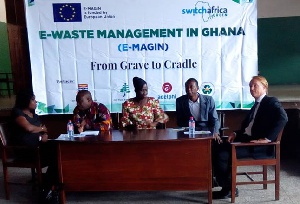The University of Cape Coast (UCC) has initiated measures through the E-Waste Management Ghana (E-MAGIN) to contribute to the effective implementation of the hazardous and Electronic Waste Control and Management Act 917.
E-MAGIN seeks to formalize the Micro, Small and Medium-sized Enterprises (MSMEs), establish a collection mechanism for e-waste, build capacity of the MSMEs to adapt to best dismantling practices, and provide informative support.
The event seeks to create awareness among the key target groups such as MSMEs in the e-waste recycling, collection, dismantling and refurbishing business, formal sector associations, manufacturers, wholesalers and distributors of consumer electronics, Technical Institutions and Government Authorities.
Other beneficiaries include employees of the MSMEs and their dependants, as well as local communities and government agencies in the e-waste sector towards Sustainable Consumption Production (SCP).
Professor Rosemond Boohene, the Project Coordinator of E-MAGIN, at the opening of a three-day workshop in Accra on Tuesday, said the use of electrical and electronic equipment and the high rate of obsolescence of the equipment leads to an increased generation of e-waste.
She said the alarming rate of e-waste generation had become a major global concern because e-waste contained hazardous constituents that were potentially harmful to the environment and human health if they were not handled properly.
“The presence of valuable resources such as copper, aluminium, silver, gold and platinum, however makes it attractive to recycle e-waste,” she said.
Prof Boohene said majority of the waste streams were however managed by the informal sector, which was made up of network of collectors, refurbishers, intermediaries, and scrap dealers specializing in manual dismantling under very hazardous conditions.
She said there was the need to reduce the disastrous environmental and social impacts of current e-waste management practices and promote sustainable consumption patterns.
She said the Government’s has passed the Hazardous and Electronic Waste Control and Management Bill into law, Act 917.
She said the E-MAGIN project was a 48 month project, which was supported with a grant from the European Union, adding that, the project was implemented by the University of Cape Coast, Adelphi (Germany), Ghana National Cleaner Production Centre and City Waste Recycling Limited.
Madam Letitia Nyaaba, Principal Programme Officer, Ghana National Cleaner Production Centre (GNCPC) in her presentation said, there were hazardous elements in the e-waste materials.
She therefore advised scrap dealers to find a proper way of disposing the e-waste rather than burning them, adding that each and every one had a role to play in reducing e-waste in the country.
Madam Nyaaba urged the participants to register their Association in order to be recognized in the sector.
The project, includes five work packages which were Value Chain Assessments and Best Practice Analysis, Creation and Reactivation of Formal Sector Associations, Establishment of Collection Mechanism in the targeted areas, Capacity Building and Trainer of Trainers and Policy Dialogue and Dissemination.
The project was implemented in eight Regions including; Ashanti, Brong Ahafo, Central, Eastern, Greater Accra, Northern, Volta and Western Region.
Participants present at the workshop were scrap dealers and electronic repairers.
General News of Wednesday, 8 August 2018
Source: ghananewsagency.org
UCC holds workshop on E-Waste management
Entertainment
















